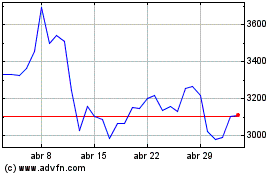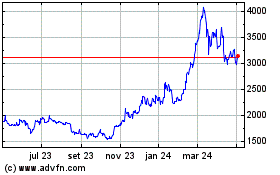US elections and crypto volatility: Bitcoin may rise 47.8% after
results
Global crypto funds, managed by giants like BlackRock and
Grayscale, received net inflows of $2.18 billion last week,
reaching $29.2 billion year-to-date, according to CoinShares. This
flow was driven by political expectations, with election poll
shifts impacting Bitcoin’s sensitivity. Total assets under
management surpassed $100 billion, while Bernstein analysts foresee
a rise to $80,000-$90,000 if Trump wins, and a drop to $50,000 with
a Harris victory.
Cryptocurrency markets are expected to remain volatile until
U.S. presidential election results are confirmed, influencing
short-term pricing. Bitcoin (COIN:BTCUSD) is down 1.6% in the last
24 hours, trading at $67,674.67. Past elections saw significant
Bitcoin increases, as noted in 2012, 2016, and 2020. Despite
decreasing returns, this trend could lift BTC by up to 47.8%,
reaching $103,500 by the end of 2025, according to CoinDesk.
Polymarket, a crypto prediction market, created two contracts
for the U.S. presidential election, one for the “winner” and
another for the “sworn-in candidate.” The first relies on media
networks to decide the winner, while the second waits until January
20, Inauguration Day, to settle bets. In case of election disputes
or uncertainties, the “sworn-in” contract offers greater security
for investors, reflecting the growing complexity of electoral
predictions in politically polarized markets.
Major crypto investors are heavily betting on a Donald Trump
victory. Five “whales” control more than 50% of bets favoring
Trump, potentially earning up to $81 million if he wins. With
millions already at stake, the November 5 election is drawing
significant interest from crypto investors. The counting process
could take days, especially in key states like Arizona and
Pennsylvania, where tight races are anticipated.
Fairshake Super PAC raises $78 million to boost U.S. crypto
policies
The Fairshake Super PAC, focused on crypto policies, has raised
$78 million to support pro-innovation blockchain candidates. This
includes $30 million in cash and $48 million in new commitments,
with notable donations from Coinbase ($25 million) and Andreessen
Horowitz ($23 million). Its goal is to influence U.S. policy amid
regulatory pressures, advocating for clear regulations that
encourage innovation and job creation. Fairshake aims for
bipartisan impact in Congress by 2026.
Ethereum celebrates 11 years of innovation with smart contracts and
DeFi
Eleven years ago, Vitalik Buterin released Ethereum’s
“proto-white paper,” introducing smart contracts and the vision of
a decentralized platform. This concept laid the foundation for
DeFi, which today provides financial alternatives, like lending and
exchanges, without intermediaries. Beyond finance, Ethereum
(COIN:ETHUSD) has impacted sectors like tourism, facilitating
payments and ticketing. In the coming years, Ethereum aims to
tackle interoperability challenges, promoting increased
institutional adoption and prioritizing user security against cyber
threats.
Solana hits record monthly activity with memecoin popularity
In October, the Solana network (COIN:SOLUSD) set a record with
123 million active addresses, up 42% from September. Memecoins,
especially via platforms like Pump.fun and Raydium, fueled this
activity. Solana also surpassed Ethereum and other blockchains in
monthly engagement, with over 100 million active addresses. The
network attracts users with fast transactions and low costs, ideal
for high-frequency trading.
Rune Christensen proposes deflationary tokenomics for MakerDAO
Rune Christensen, co-founder of Sky (formerly MakerDAO), plans a
“strictly deflationary” model for its main token, reducing the
total supply through token burns and avoiding new issuance under
normal conditions. This model would only allow additional token
creation in emergencies, like insolvency risk. The proposal also
includes token rewards for governance engagement, with voting
scheduled for November 11 to 14.
Celestia gets recovery predictions after sharp decline
Celestia (COIN:TIAUSD) dropped 4.4% in the past 24 hours to
$4.36, showing a roughly 57% decline over the last six months due
to increased selling pressure and token unlocks. However, technical
analysis, including Bollinger Bands and the Relative Strength Index
(RSI), indicates a potential reversal. Support near $4.12 could
boost recovery to $5.23 if held, though a break of this level might
push TIA down to $3.72.
Tether dismisses rumors of launching its own blockchain
Tether (COIN:USDTUSD) CEO Paolo Ardoino denied that the
stablecoin company plans to launch its own blockchain, emphasizing
the importance of neutrality and partnerships with other platforms.
Ardoino noted that blockchains are seen as transport layers and
that the market is already saturated, making an official blockchain
launch unnecessary. The company remains focused on integrating its
stablecoins into Layer 2 solutions to enhance usability and reduce
fees.
Listing fees debate: Coinbase, Binance, and crypto leaders’
accusations
Justin Sun and Andre Cronje claimed that Coinbase (NASDAQ:COIN)
demands high fees for asset listings, despite CEO Brian Armstrong’s
insistence that listings are free. Armstrong responded by stating
that Coinbase doesn’t charge fees but offers an optional Earn
marketing program, which doesn’t impact listing status. However,
Cronje and Sun allege Coinbase requested millions in fees and
deposits, contrasting with Binance, which reportedly doesn’t charge
for listings. The controversy highlighted differing views on entry
costs for major exchanges.
Kraken launches crypto derivatives brokerage in Australia
Kraken exchange has launched a licensed brokerage in Australia,
geared toward institutional investors, allowing crypto derivatives
trading without the need to directly hold digital assets. Available
since November 3, the service supports fiat and crypto as
collateral, along with risk management tools.
Singapore advances in financial tokenization with MAS initiatives
The Monetary Authority of Singapore (MAS) announced new
initiatives to bolster tokenization in finance, aiming to increase
liquidity and infrastructure for tokenized assets. Among efforts,
MAS will implement “Project Guardian,” a collaboration between
major financial institutions like Citi (NYSE:C) and HSBC
(NYSE:HSBC), to explore tokenization in capital markets. The
initiative includes specific guidelines for fixed income and
tokenized funds and permits using the digital Singapore dollar for
secure transactional settlements.
Deutsche Telekom bets on sustainable Bitcoin mining in Germany
Deutsche Telekom (TG:DTE) announced its new Bitcoin mining
project, “Digital Monetary Photosynthesis,” utilizing previously
unused renewable energy. Developed by Telekom’s subsidiary MMS and
in partnership with Bankhaus Metzler, the project aims to stabilize
Germany’s power grid by converting excess energy into digital
value. Operations will take place in Backnang, at Riva’s
facilities, with potential to expand financial services for digital
assets.
Alibaba cuts metaverse operations amid AI focus
Alibaba (NYSE:BABA) is scaling back its metaverse division,
laying off dozens of employees to focus on greater efficiency,
according to the South China Morning Post. Founded in 2021, the
Yuanjing metaverse unit, based in Shanghai and Hangzhou, received
billions of yuan but lost momentum as resources shifted to
artificial intelligence, a trend also seen among other tech giants.
Despite cuts, the division continues to offer tools and services in
the metaverse.
AI agents and cryptocurrencies: a new autonomous financial future
The growing presence of AI agents promoting, creating, and
transacting cryptocurrencies is transforming the market. Examples
like the Luna bot and the Terminal of Truths platform drive
adoption, allowing transactions without human oversight and
encouraging interaction through tipping and memecoins. Coinbase
launched the Based Agents, enabling users to create AI agents with
wallets in minutes. This integration promises to revolutionize DAOs
and DeFi but still faces security challenges and legal
questions.
Zodia Custody seeks $50 million for global expansion and new
services
Supported by Standard Chartered (LSE:STAN), Zodia Custody is
negotiating $50 million in funding to expand internationally and
diversify its offerings. According to CEO Julian Sawyer, the new
funding round will attract payment and tokenization companies,
strengthening its expansion. This funding, advised by Architect
Partners, follows a $36 million round led by SBI Holdings in April.
Recently, Zodia partnered with 21Shares to offer secure crypto ETP
custody in Europe and Switzerland, enhancing security and
regulatory compliance for investors.
Fake police identity scam involves Bitcoin payment in Colorado
Scammers in Colorado, United States, posed as police, deceiving
residents into paying non-existent fines in Bitcoin. In one case, a
scammer claimed the victim owed $10,000 for missing jury duty,
leading to a $6,000 Bitcoin transfer. Authorities prevented the
remaining amount from being transferred, avoiding further losses.
Officials caution that they never request payments in
cryptocurrencies by phone, highlighting the importance of caution
with irreversible blockchain transactions.
Ethereum (COIN:ETHUSD)
Gráfico Histórico do Ativo
De Dez 2024 até Jan 2025

Ethereum (COIN:ETHUSD)
Gráfico Histórico do Ativo
De Jan 2024 até Jan 2025
